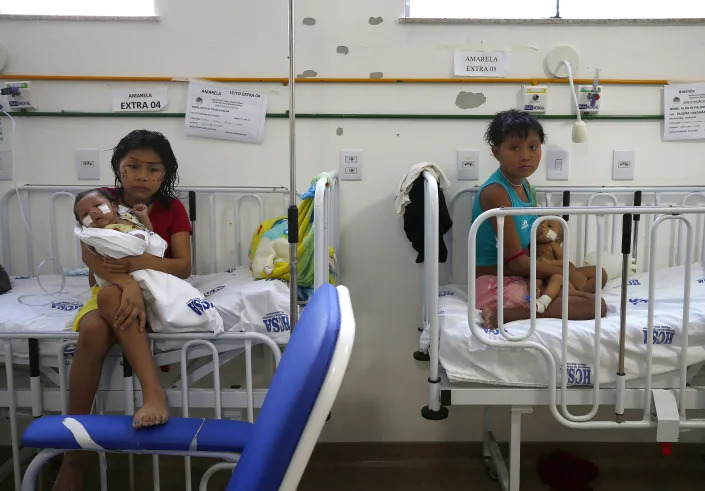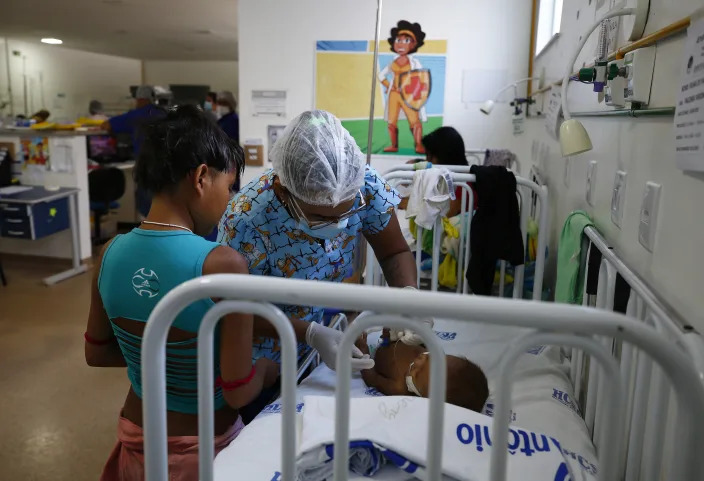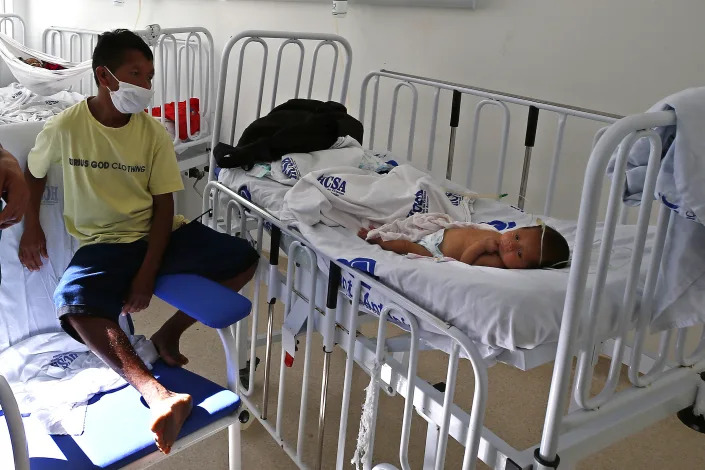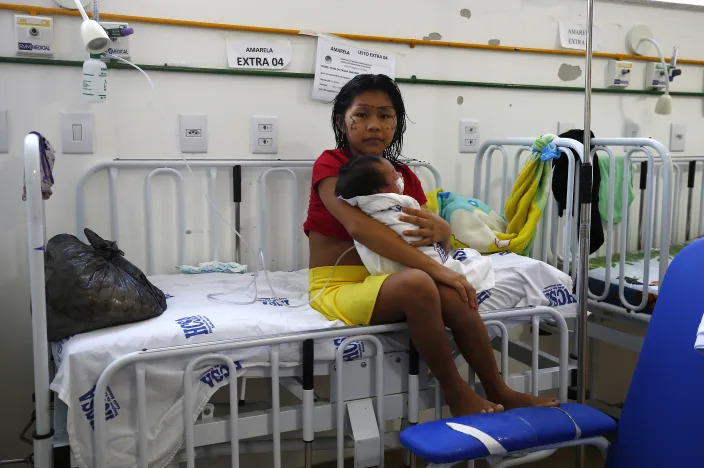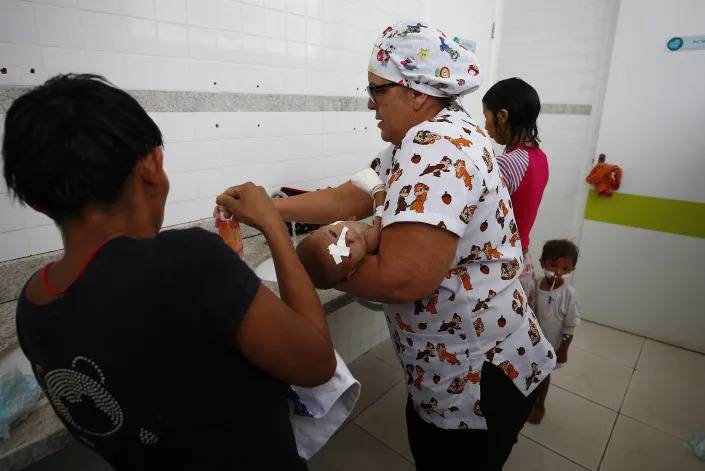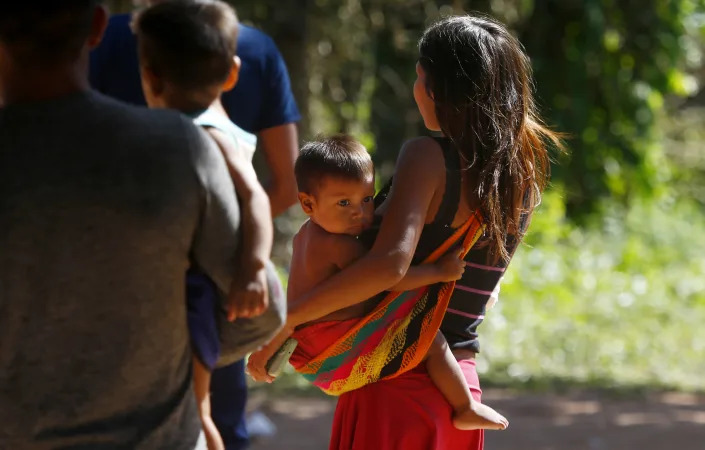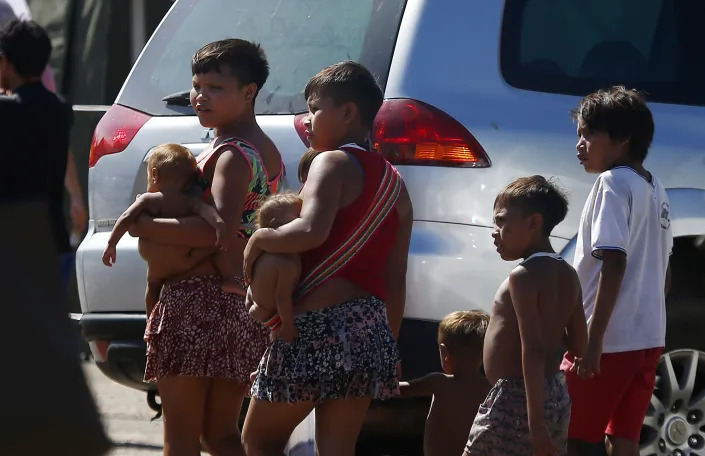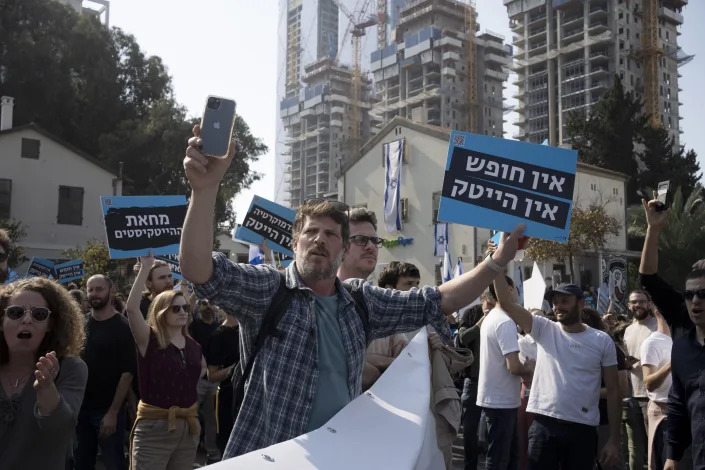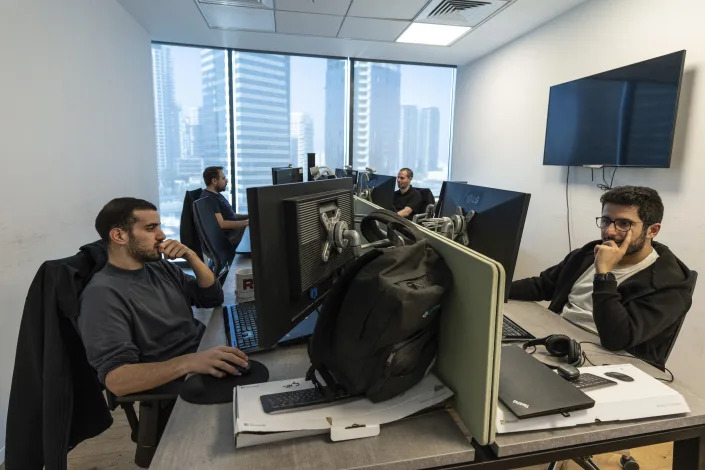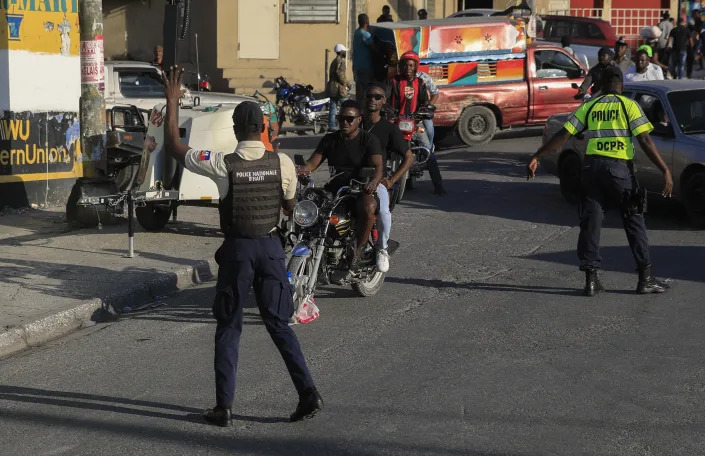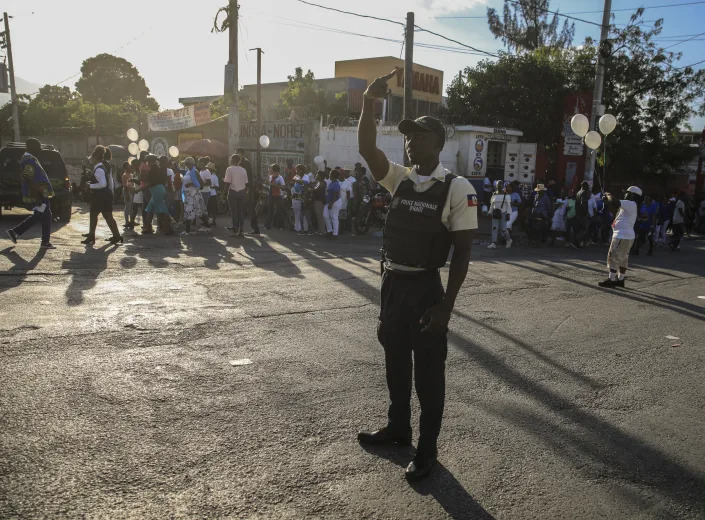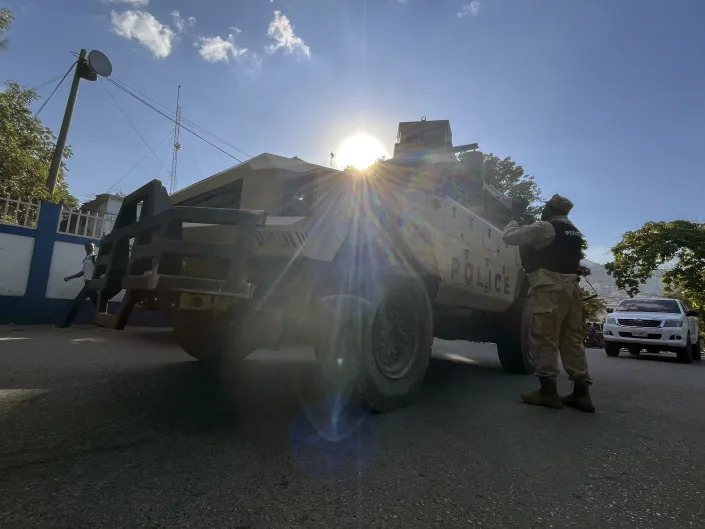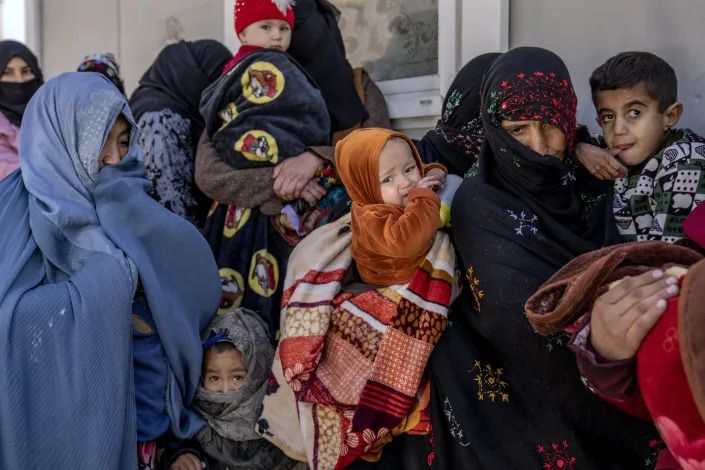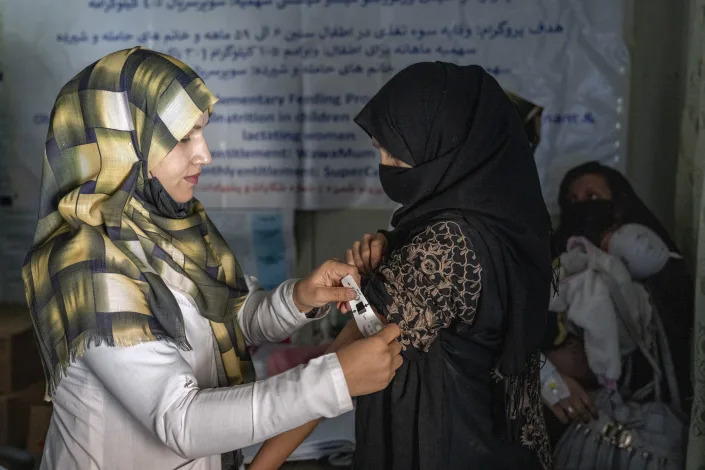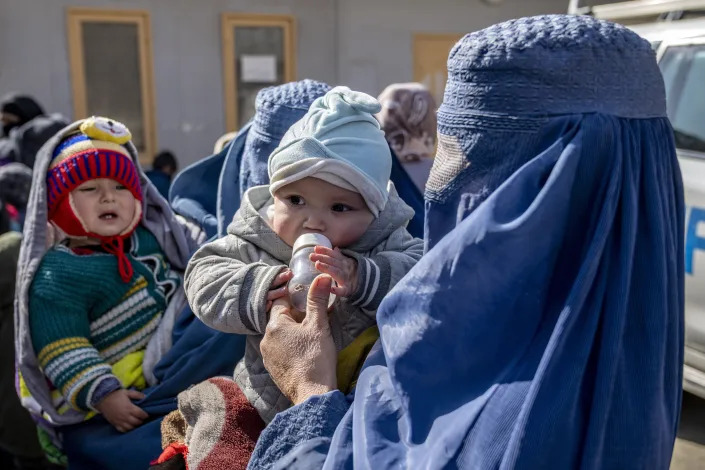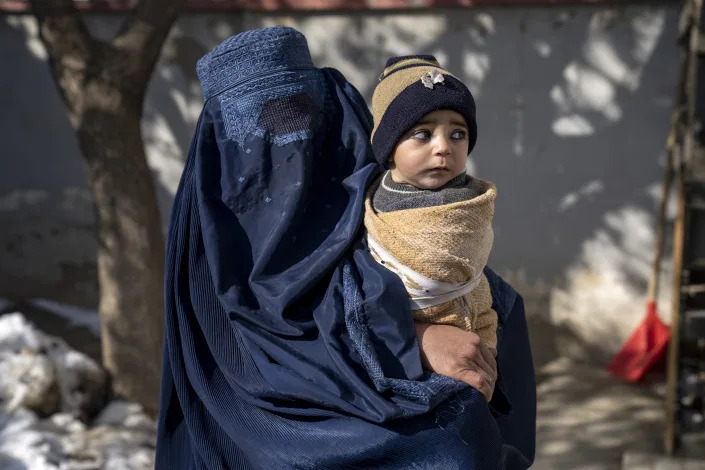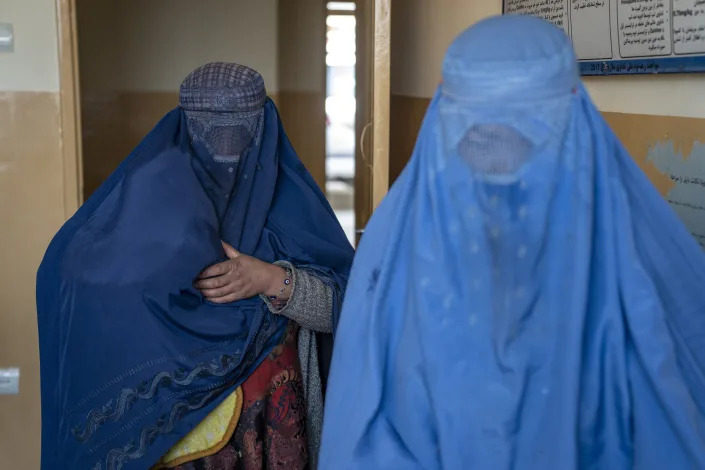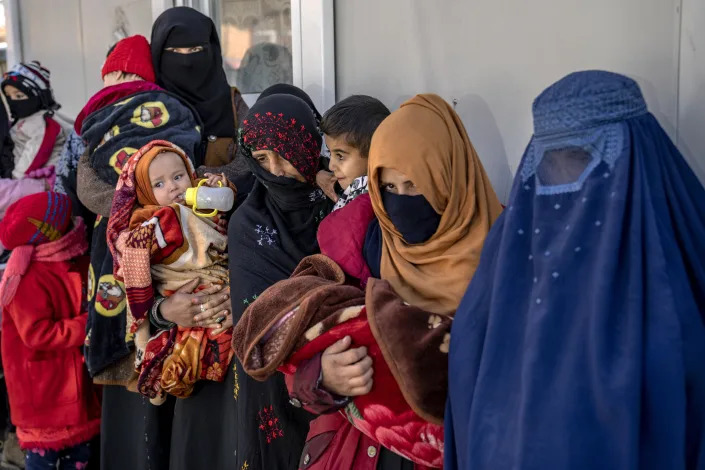In Brazil's Amazon, malnourished Yanomami children get needed care
Alan Chaves with Ramon Sahmkow in Brasilia
Fri, 27 January 2023
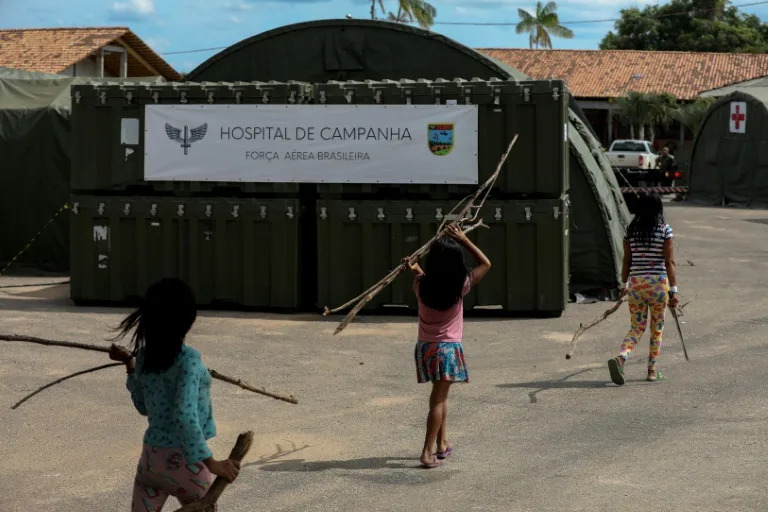
In a hospital in Brazil's Amazon, half a dozen Yanomami children are dozing in blue hammocks. Some are suffering from pneumonia, others from malaria. Some even have snake bites. All of them are underfed.
Cases of malnutrition and malaria in the region have skyrocketed in recent weeks, prompting the new leftist government of President Lula Inacio Lula da Silva to declare a health emergency.
Of the nearly 60 Indigenous children being treated at the San Antonio children's hospital in Boa Vista, in the northern state of Roraima, three-quarters of them are Yanomami, and eight of those are in intensive care, according to official data.
The vast majority of children are suffering from "moderate to severe malnutrition," complicated by other ailments including pneumonia, malaria and the stomach flu, pediatrician Eugenio Patricio tells AFP.
"These patients, due to malnutrition, don't have enough in the tank to fight infections. So the consequences are far more serious, and some end up in intensive care," he adds.
The San Antonio hospital is the only one in the state -- located on the country's northern border with Venezuela and Guyana -- that can treat children under the age of 12.
To get there, many of the Indigenous patients must be flown in from their remote jungle villages.
Most of the Yanomami children, who are generally eight years old or younger, are about half the normal weight for their age -- and sometimes even less, Patricio explains.
"They are extremely weak when they arrive here," he says.
While the San Antonio hospital handles the most serious cases, other Indigenous youth and adults are treated at another facility in Boa Vista.
And a field hospital built by the Brazilian air force opened its doors Friday in the courtyard of the Indigenous health center to help handle the crisis.
- Illegal mining -
Last week, Lula's government said that 99 Yanomami children under the age of five had died in 2022 on Brazil's largest Indigenous reservation, mainly due to malnutrition, pneumonia and malaria.
Federal police are investigating possible acts of "genocide" against the Yanomami people, to determine whether the neglect and lack of health access was intentional on the part of public officials in the administration of far-right ex-leader Jair Bolsonaro.
Conditions on the Yanomami reservation have become increasingly violent, with illegal miners regularly killing Indigenous residents, sexually abusing women and children and contaminating the area's rivers with the mercury used to separate gold from sediment, according to complaints from Indigenous organizations.
And the increase of illegal mining in the Amazon has driven the spread of diseases such as malaria, tuberculosis and Covid-19, according to experts.
The country's Supreme Court had ordered the removal of gold miners in the area, but the Bolsonaro government, which encouraged mining and agribusiness activities on Indigenous lands, never complied.
vid-rsr/ja/sst
Alan Chaves with Ramon Sahmkow in Brasilia
Fri, 27 January 2023

In a hospital in Brazil's Amazon, half a dozen Yanomami children are dozing in blue hammocks. Some are suffering from pneumonia, others from malaria. Some even have snake bites. All of them are underfed.
Cases of malnutrition and malaria in the region have skyrocketed in recent weeks, prompting the new leftist government of President Lula Inacio Lula da Silva to declare a health emergency.
Of the nearly 60 Indigenous children being treated at the San Antonio children's hospital in Boa Vista, in the northern state of Roraima, three-quarters of them are Yanomami, and eight of those are in intensive care, according to official data.
The vast majority of children are suffering from "moderate to severe malnutrition," complicated by other ailments including pneumonia, malaria and the stomach flu, pediatrician Eugenio Patricio tells AFP.
"These patients, due to malnutrition, don't have enough in the tank to fight infections. So the consequences are far more serious, and some end up in intensive care," he adds.
The San Antonio hospital is the only one in the state -- located on the country's northern border with Venezuela and Guyana -- that can treat children under the age of 12.
To get there, many of the Indigenous patients must be flown in from their remote jungle villages.
Most of the Yanomami children, who are generally eight years old or younger, are about half the normal weight for their age -- and sometimes even less, Patricio explains.
"They are extremely weak when they arrive here," he says.
While the San Antonio hospital handles the most serious cases, other Indigenous youth and adults are treated at another facility in Boa Vista.
And a field hospital built by the Brazilian air force opened its doors Friday in the courtyard of the Indigenous health center to help handle the crisis.
- Illegal mining -
Last week, Lula's government said that 99 Yanomami children under the age of five had died in 2022 on Brazil's largest Indigenous reservation, mainly due to malnutrition, pneumonia and malaria.
Federal police are investigating possible acts of "genocide" against the Yanomami people, to determine whether the neglect and lack of health access was intentional on the part of public officials in the administration of far-right ex-leader Jair Bolsonaro.
Conditions on the Yanomami reservation have become increasingly violent, with illegal miners regularly killing Indigenous residents, sexually abusing women and children and contaminating the area's rivers with the mercury used to separate gold from sediment, according to complaints from Indigenous organizations.
And the increase of illegal mining in the Amazon has driven the spread of diseases such as malaria, tuberculosis and Covid-19, according to experts.
The country's Supreme Court had ordered the removal of gold miners in the area, but the Bolsonaro government, which encouraged mining and agribusiness activities on Indigenous lands, never complied.
vid-rsr/ja/sst
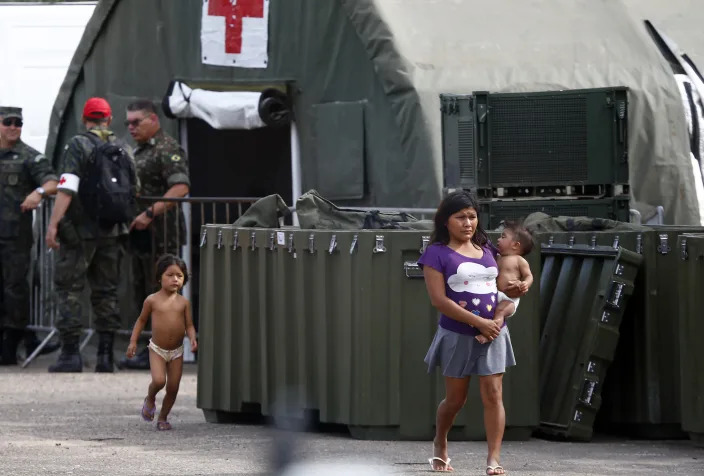
A Yanomami woman carrying a baby, walks next to an Army field hospital, on the grounds of the Saude Indigenous House, a center responsible for supporting and assisting Indigenous people in Boa Vista, Roraima state, Brazil, Wednesday, Jan. 25, 2023. The government declared a public health emergency for the Yanomami people in the Amazon, who are suffering from malnutrition and diseases such as malaria.
(AP Photo/Edmar Barros)
ELÉONORE HUGHES and EDMAR BARROS
Thu, January 26, 2023
BOA VISTA, Brazil (AP) — Severe malnutrition and disease, particularly malaria, are decimating the Yanomami population in Brazil's Amazon rainforest, and on Jan. 20 the federal government declared a public health emergency. While many in Brazil were left wondering how the calamity could materialize seemingly overnight, it didn't come as a surprise to those familiar with the Yanomami’s circumstances, who have issued warnings for several years.
The AP explains how the Yanomami reached this tragic point.
____
WHO ARE THE YANOMAMI?
An estimated 30,000 Yanomami people live in Brazil’s largest indigenous territory, which covers an area roughly the size of Portugal and stretches across Roraima and Amazonas states in the northwest corner of Brazil's Amazon. Some also live in southern Venezuela. They provide food for themselves by hunting, gathering, fishing, and growing crops in large gardens cleared from the forest. Every few years, the Yanomami move from one area to another, allowing the soil to regenerate.
____
WHAT IS CAUSING THE CRISIS?
Illegal gold miners were first present in Yanomami territory during the 1980s, but then were largely expelled. They have flooded back in recent years, attracted by high gold prices and urged on by former President Jair Bolsonaro. Their numbers surged to 20,000 during Bolsonaro’s administration, according to estimates from environmental and Indigenous rights groups.
Miners destroy the habitat of animals that the Yanomami hunt, and occupy fertile land that the Yanomami use to farm. The miners also process ore with mercury that poisons the rivers that the Yanomami depend upon for fish. Mining creates pools of stagnant water where mosquitoes that transmit illness breed. And miners relocating to exploit new areas spread sickness to native people who possess low immunity due to limited contact with outsiders.
“The impacts accumulate,” said Estêvão Senra, a geographer and researcher at Instituto Socioambiental, an environmental and Indigenous rights non-profit. “If (the Yanomami) are sick, they miss the right moment to open a new area for farming, compromising their future.”
An AP investigative series last year detailed how the scale of prospecting on Indigenous lands exploded in recent years, illegally mined gold seeps into global supply chains, and mining stokes divisions within Indigenous territories.
____
WAS THIS A SUDDEN DISASTER?
No. It has spiraled over the course of several years. Eight of 10 children aged 5 or under had chronic malnutrition in 2020, according to a study in two Yanomami regions by UNICEF and Brazilian state health research institute Fiocruz. There were 44,069 cases of malaria in two years, meaning the entire population was contaminated, some people more than once, Roraima state’s public prosecutor’s office said in 2021, citing data from Brazil’s country-wide disease notification system.
Curable conditions like flu, pneumonia, anemia and diarrhea become life-threatening. At least 570 Yanomami children died from untreated diseases during Bolsonaro’s term, from 2019 to 2022, according to Health Ministry data obtained by independent local news website Sumauma. That marked a 29% increase from the prior four years.
There was a greater need for medical care, but services for Indigenous peoples deteriorated under Bolsonaro, according to Adriana Athila, an anthropologist who has studied public healthcare for the Yanomami, which is provided by one of the special districts designed for the needs of Indigenous communities. There have also been reports of miners taking control of health facilities and airstrips in Yanomami territory for their own use. Local leaders themselves have been sounding the alarm for years.
“The miners are destroying our rivers, our forest and our children. Our air is no longer pure, our game is disappearing and our people are crying out for clean water,” Júnior Hekurari Yanomami, president of the Yanomami local health council, wrote on Twitter last March. “We want to live, we want our peace back and our territory.”
The recent influx of miners severely exacerbated the disruption of traditional Yanomami life that took place over the prior two decades. That was caused by the introduction of social welfare programs that forced people to make weeks-long trips to collect their benefits in cities, where they often remain for extended periods in squalid conditions, as well as the establishment of non-Indigenous institutions, such as military bases, medical posts, and religious missions, which transformed some temporary villages into permanent settlements, depleting hunting and soil resources.
____
WHAT WAS BOLSONARO’S ROLE?
As a young lawmaker in the 1990s, Bolsonaro fiercely opposed the creation of the Yanomami territory. More recently, he openly championed mining in Indigenous lands and the integration of native peoples into modern society. Environmentalists, activists and the vast majority of Indigenous groups slammed his efforts and warned of devastating impacts. He pressured Congress for an emergency vote on the bill his mining and justice ministries drafted and presented in 2020 to regulate the mining of Indigenous lands, but lawmakers demurred. Even large mining companies repudiated the proposal.
Wildcat gold miners, for their part, were undeterred, “because they knew the government would turn a blind eye,” Senra said.
Hekurari on Saturday also accused Bolsonaro’s administration of ignoring some 50 letters pleading for help. That is in part why some, including President Lula, have accused Bolsonaro of genocide.
Bolsonaro called such claims “another left-wing farce” on his Telegram channel Sunday, and said Indigenous healthcare was one of the government’s priorities, citing implementation of a sanitary protocol for entry into their territories during the COVID-19 pandemic. He said that during his administration the health ministry provided more than 53 million basic-care services to Indigenous peoples.
____
HOW HAS LULA RESPONDED?
After defeating Bolsonaro in the October election, Lula took power Jan. 1. The change created an expectation that the burgeoning crisis would finally receive attention, said Senra, given the sharp reversal for Amazon policy Lula had outlined on the campaign trail. Indeed, Lula dispatched a team to Yanomami territory last week and on Saturday traveled to Boa Vista, the nearby capital of Roraima, where many Yanomami people have been medevaced for treatment.
Following Lula’s declaration of a medical emergency, the army began flying food kits into Yanomami territory and set up a field hospital in Boa Vista, while the health ministry put out a nationwide call for medical professionals to volunteer.
Marcos Pelligrini, a former doctor within Yanomami territory and professor of collective health at the Federal University of Roraima in Boa Vista, said that he felt relief upon seeing army helicopters transporting food kits.
“It’s a moment of hope,” he said.
But going forward, the miners still must be removed from the region by the Federal Police and environment regulator Ibama, with help from the defense ministry, Minister for Indigenous Peoples Sonia Guajajara told newspaper Estado de S. Paulo.
___
Hughes reported from Rio de Janeiro. AP writer Fabiano Maisonnave contributed.
ELÉONORE HUGHES and EDMAR BARROS
Thu, January 26, 2023
BOA VISTA, Brazil (AP) — Severe malnutrition and disease, particularly malaria, are decimating the Yanomami population in Brazil's Amazon rainforest, and on Jan. 20 the federal government declared a public health emergency. While many in Brazil were left wondering how the calamity could materialize seemingly overnight, it didn't come as a surprise to those familiar with the Yanomami’s circumstances, who have issued warnings for several years.
The AP explains how the Yanomami reached this tragic point.
____
WHO ARE THE YANOMAMI?
An estimated 30,000 Yanomami people live in Brazil’s largest indigenous territory, which covers an area roughly the size of Portugal and stretches across Roraima and Amazonas states in the northwest corner of Brazil's Amazon. Some also live in southern Venezuela. They provide food for themselves by hunting, gathering, fishing, and growing crops in large gardens cleared from the forest. Every few years, the Yanomami move from one area to another, allowing the soil to regenerate.
____
WHAT IS CAUSING THE CRISIS?
Illegal gold miners were first present in Yanomami territory during the 1980s, but then were largely expelled. They have flooded back in recent years, attracted by high gold prices and urged on by former President Jair Bolsonaro. Their numbers surged to 20,000 during Bolsonaro’s administration, according to estimates from environmental and Indigenous rights groups.
Miners destroy the habitat of animals that the Yanomami hunt, and occupy fertile land that the Yanomami use to farm. The miners also process ore with mercury that poisons the rivers that the Yanomami depend upon for fish. Mining creates pools of stagnant water where mosquitoes that transmit illness breed. And miners relocating to exploit new areas spread sickness to native people who possess low immunity due to limited contact with outsiders.
“The impacts accumulate,” said Estêvão Senra, a geographer and researcher at Instituto Socioambiental, an environmental and Indigenous rights non-profit. “If (the Yanomami) are sick, they miss the right moment to open a new area for farming, compromising their future.”
An AP investigative series last year detailed how the scale of prospecting on Indigenous lands exploded in recent years, illegally mined gold seeps into global supply chains, and mining stokes divisions within Indigenous territories.
____
WAS THIS A SUDDEN DISASTER?
No. It has spiraled over the course of several years. Eight of 10 children aged 5 or under had chronic malnutrition in 2020, according to a study in two Yanomami regions by UNICEF and Brazilian state health research institute Fiocruz. There were 44,069 cases of malaria in two years, meaning the entire population was contaminated, some people more than once, Roraima state’s public prosecutor’s office said in 2021, citing data from Brazil’s country-wide disease notification system.
Curable conditions like flu, pneumonia, anemia and diarrhea become life-threatening. At least 570 Yanomami children died from untreated diseases during Bolsonaro’s term, from 2019 to 2022, according to Health Ministry data obtained by independent local news website Sumauma. That marked a 29% increase from the prior four years.
There was a greater need for medical care, but services for Indigenous peoples deteriorated under Bolsonaro, according to Adriana Athila, an anthropologist who has studied public healthcare for the Yanomami, which is provided by one of the special districts designed for the needs of Indigenous communities. There have also been reports of miners taking control of health facilities and airstrips in Yanomami territory for their own use. Local leaders themselves have been sounding the alarm for years.
“The miners are destroying our rivers, our forest and our children. Our air is no longer pure, our game is disappearing and our people are crying out for clean water,” Júnior Hekurari Yanomami, president of the Yanomami local health council, wrote on Twitter last March. “We want to live, we want our peace back and our territory.”
The recent influx of miners severely exacerbated the disruption of traditional Yanomami life that took place over the prior two decades. That was caused by the introduction of social welfare programs that forced people to make weeks-long trips to collect their benefits in cities, where they often remain for extended periods in squalid conditions, as well as the establishment of non-Indigenous institutions, such as military bases, medical posts, and religious missions, which transformed some temporary villages into permanent settlements, depleting hunting and soil resources.
____
WHAT WAS BOLSONARO’S ROLE?
As a young lawmaker in the 1990s, Bolsonaro fiercely opposed the creation of the Yanomami territory. More recently, he openly championed mining in Indigenous lands and the integration of native peoples into modern society. Environmentalists, activists and the vast majority of Indigenous groups slammed his efforts and warned of devastating impacts. He pressured Congress for an emergency vote on the bill his mining and justice ministries drafted and presented in 2020 to regulate the mining of Indigenous lands, but lawmakers demurred. Even large mining companies repudiated the proposal.
Wildcat gold miners, for their part, were undeterred, “because they knew the government would turn a blind eye,” Senra said.
Hekurari on Saturday also accused Bolsonaro’s administration of ignoring some 50 letters pleading for help. That is in part why some, including President Lula, have accused Bolsonaro of genocide.
Bolsonaro called such claims “another left-wing farce” on his Telegram channel Sunday, and said Indigenous healthcare was one of the government’s priorities, citing implementation of a sanitary protocol for entry into their territories during the COVID-19 pandemic. He said that during his administration the health ministry provided more than 53 million basic-care services to Indigenous peoples.
____
HOW HAS LULA RESPONDED?
After defeating Bolsonaro in the October election, Lula took power Jan. 1. The change created an expectation that the burgeoning crisis would finally receive attention, said Senra, given the sharp reversal for Amazon policy Lula had outlined on the campaign trail. Indeed, Lula dispatched a team to Yanomami territory last week and on Saturday traveled to Boa Vista, the nearby capital of Roraima, where many Yanomami people have been medevaced for treatment.
Following Lula’s declaration of a medical emergency, the army began flying food kits into Yanomami territory and set up a field hospital in Boa Vista, while the health ministry put out a nationwide call for medical professionals to volunteer.
Marcos Pelligrini, a former doctor within Yanomami territory and professor of collective health at the Federal University of Roraima in Boa Vista, said that he felt relief upon seeing army helicopters transporting food kits.
“It’s a moment of hope,” he said.
But going forward, the miners still must be removed from the region by the Federal Police and environment regulator Ibama, with help from the defense ministry, Minister for Indigenous Peoples Sonia Guajajara told newspaper Estado de S. Paulo.
___
Hughes reported from Rio de Janeiro. AP writer Fabiano Maisonnave contributed.

